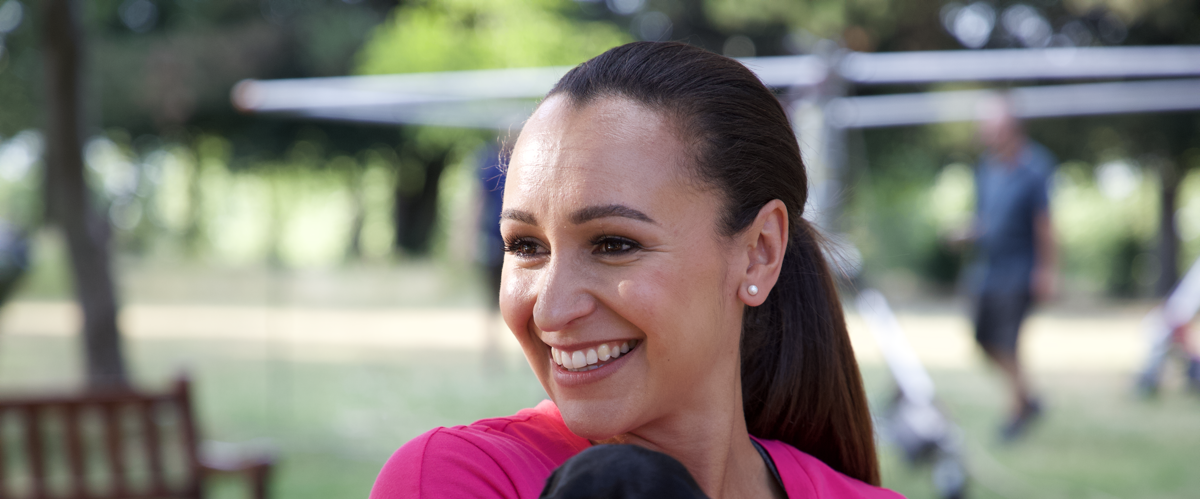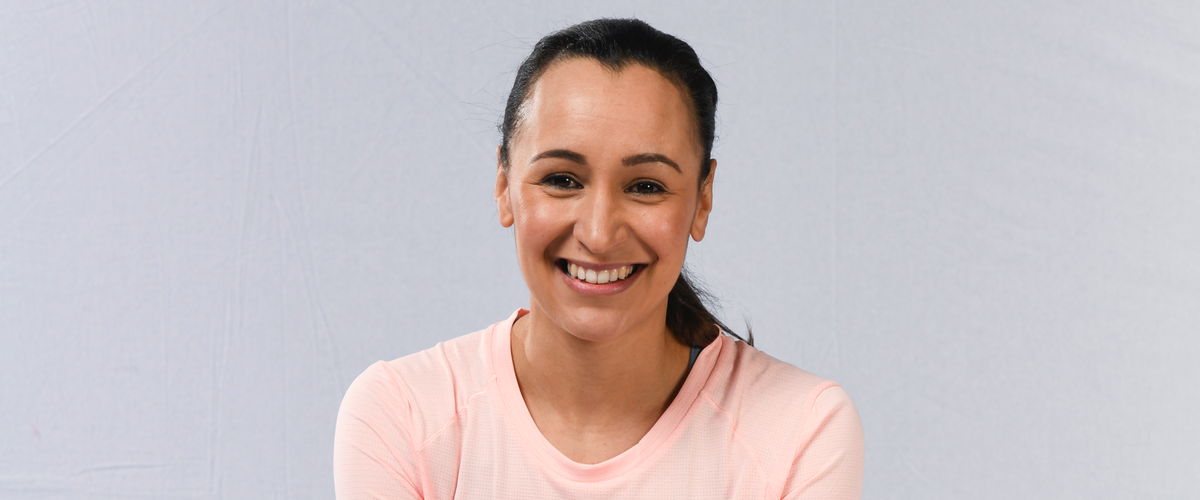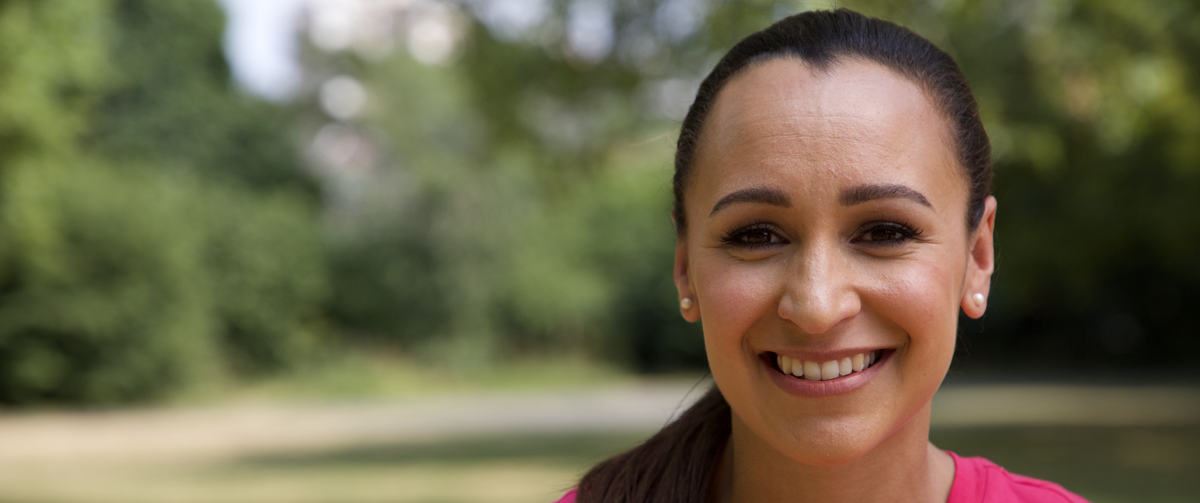‘We need safe spaces to talk openly’: Jessica Ennis-Hill on beating hormone health taboos
Jessica Ennis-Hill is on a mission empower women with knowledge about their hormones. Read how in this interview with Vitality Magazine

It was 11 years ago that Dame Jessica Ennis-Hill – the poster girl of the 2012 games and long-serving Vitality ambassador – stood on top of the podium as the nation’s heptathlon heroine.
With two World Championship gold medals already under her belt, Jessica (just Ennis back then) was the hot favourite to bring home a medal (preferably gold) for Great Britain in a home games. There’s no pressure like having your face embossed on a field by the side of the runway at Heathrow Airport…
And her sterling status was soon projected to that of legend when she burst into the lead of the last of the seven-event competition, the 800m – a win she did not need to take the title – and crossed the finish line at the head of the pack.
An eruption of ecstasy engulfed the stadium and Jess, in epic style, sealed her fate in the hearts of the British nation.
“For me, I can remember the emotions, how I felt when I stepped out onto the track for the first time for the hurdles; how I felt after the 800m, it still feels very raw,” she tells Vitality Magazine.
“But to say it was more than 10 years ago feels bizarre. I feel very fortunate that I was in that phase of my career at the age I was when a home games came around.”
And so, our Jess, at the tender age of 26, had achieved athletic glory. Her 15-year-long career reached its pinnacle.
Still in the spotlight from her 2012 successes, our new gold-medallist married her childhood sweetheart, Andy Hill, and later welcomed her son, Reggie, in the July of 2014.
Not ready to hang up her spikes just yet after becoming a mother, Jess’s celebrity grew when she made the astonishing decision to return to the track. And so, the wheels were set in motion, and her campaign to defend her title began.
2016 rolled around and Jess, remarkably, took home the silver medal in Rio, just 35 points behind Belgium’s Nafissatou Thiam, who snatched the gold. At that point, she was ready to wave goodbye to athletics and brought her extraordinary career to a close.
A new era of health
Unsurprisingly, as a retired Olympian, Jess has picked up a few tips and tricks about women’s health and fitness, while, naturally, maintaining her passion for exercise. But not everyone has been as lucky as her to have access to teams of experts throughout their life.
Now, as a mum of two, Jess wants to share her wealth of intel to empower more women to lead happier and healthier lives through every stage. “It all started from my experience of having Reggie, towards the end of my career,” recalls Jess.
“I had all this knowledge and access to great people, and it actually made me think that a lot of women don’t have this support, and don’t know some of the basic things that they should be doing through pregnancy and postnatally.”

What was initially an idea was brought to fruition in the form of Jennis; her very own platform. By visiting the platform, users can find materials that support them through every stage of their cycle, or what is known as cycle mapping.
Effectively, cycle mapping helps you understand what the hormones are doing throughout the month and how it impacts our bodies.
By tracking hormones in this way, women can create a sustainable exercise routine and help to achieve your goals. It also helps women to understand when to push themselves a little bit harder when they exercise and when to focus on rest and recovery.
For more information on Jennis, visit www.jennis.com.
“Women can often feel despondent if they haven’t done really well on a run or in the gym, and instead of feeling like we’ve failed or that we haven’t done our best, there’s probably a really good reason for it.
“I know for me that there are times when I can push myself that little bit harder and other times when I just need to take things a bit slower and do some yoga or slow down a little bit with my exercise. That way, I know I am doing what is right for my body.”
But, as women, we have been conditioned to just accept the changes that happen to us and just get on with it.
“Whereas, actually, understanding [our hormones] and tracking them, along with lifestyle interventions like the way you exercise, the way you eat, breathwork, yoga, all of these different elements, can have a massive positive effect on how you experience your hormones through the different phases.”
There are other devices too than can help women track their cycles, including the new Garmin Venu®3, which features women’s health tracking.
Vitality members with a qualifying plan can get 10% off the new Garmin Venu®3 – a saving of £44.99. Visit vitality.co.uk to find out how to claim your discount.
As a Vitality member with a qualifying health insurance plan, you can access a Vitality GP through the app.
Here, you'll be able to book an appointment to see a GP, physiotherapist, access mental health support or call the Health Advice Line and much more.
If you want to know more about what's available with your plan, visit Care Hub by logging into Member Zone and access support and advice.
Getting to know your body
It’s not just about taking the time to map your cycle, according to Jess, it’s also harbouring a safe environment for women to talk openly about their hormonal health.
“We need to make sure there is a safe environment for young women and girls to talk openly about what has traditionally been a taboo subject, and that also counts for older women as well,” says Jess.
“It doesn’t matter what stage you are in your life; you can always get to know your body a little bit better, I know that I certainly ave from being an athlete to then being a mum and then returning to athletics before retiring.”

Vitality data shows that almost one quarter (21%) of women are too embarrassed to seek medical advice for female-related health concerns and that 20% would not start a conversation around a taboo topic for fear of being judged[1].
Jess says that women who have a platform talking about these taboo topics are helping to break down these barriers for younger and older generations.
“Women speaking out so openly about their menstrual cycle and women’s health, including Dina Asher-Smith, these women are really breaking the stigma so that young women, and older women, can have these conversations,” explains Jess.
Around 92% of women admitted to feeling unprepared for the menopause, which happens when a nosedive in women’s oestrogen levels gives way to several physiological changes, including hot flushes, difficulty sleeping, low mood and problems with memory.
But by encouraging people to openly talk about their health issues, women can gather tools to prepare for each stage of their life.
“I think that ability to understand your hormones at an earlier stage, to be able to track them, and know what’s going on, then you actually have the power to enter that phase in a really confident, knowledge-fuelled way,” adds Jess.
And she’s not shy about the fact that entering this phase worries her: “I feel terrified, but at the same time I feel that it’s an amazing opportunity.
“I know that there are so many ways to educate and help women understand those phases now and I feel that as we move on through the years, we are only going to become more empowered through the knowledge.”
Ultimately, Jess believes more research and attention needs to be given to understand women’s “complex” health phases and cycle mapping to help, not just those at an elite level, but all women.
Vitality offers menopause supportat no extra cost with private health insurance.
If you’re a qualifying Vitality health insurance member, log into Member Zone to find out how you can use the Peppy service.
Or if you'd like to find out more about Vitality health insurance, visit vitality.co.uk.
[1] Vitality data 2023Recent articles

‘parkwalk is still working out’: Victoria’s parkwalk story
Formerly a keen runner, Victoria didn’t expect to get the same benefits from walking as running – parkwalk helped change her perspective

‘I absolutely loved it’: Ellie Simmonds celebrates community at parkrun
Ellie Simmonds enjoyed the sunny weather this weekend at her first parkrun event at Gladstone with fellow walkers, highlighting the joy of exploring local areas and meeting new people

9 ways to quit smoking you probably haven’t tried
One way to help improve your cashflow and live a longer, healthier life is to quit smoking. Here are some tips that might help you kick the habit for good

